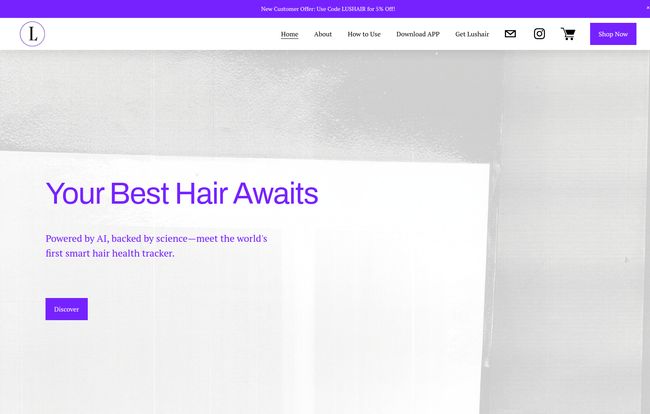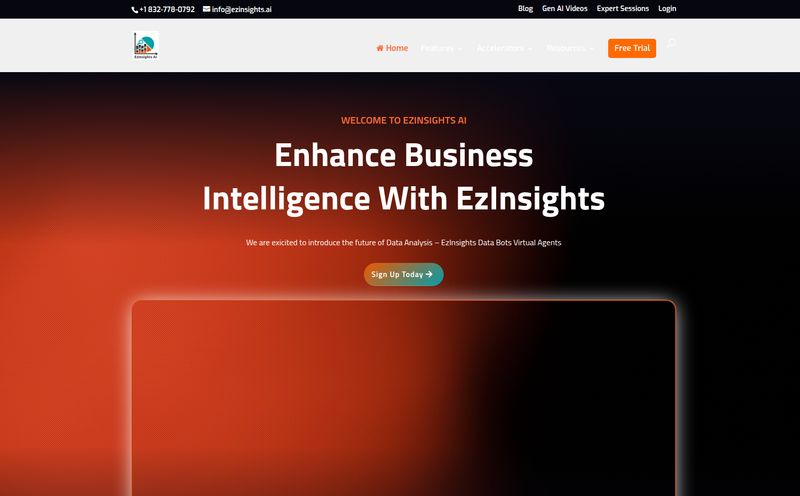The hair care aisle is a warzone. You’re bombarded with a thousand bottles all screaming promises of volume, shine, and rebirth for your weary follicles. I’ve spent more money than I’d like to admit on products that ended up in the back of my bathroom cabinet, a sad monument to broken promises and clever marketing. We’ve all been there, right? You buy something because a quiz told you you have 'wavy, combination hair,' whatever that means.
For years, the only way to get a real diagnosis for what’s happening up there was to see a dermatologist or a trichologist. Which involves waiting lists, appointments, and a bill at the end. But what if you could get that same level of deep-dive analysis from your own bathroom? That’s the big promise of Lushair, a new gadget that’s been making some noise. It claims to be an AI-powered home hair care system. My inner tech geek is intrigued, but my inner skeptic is raising an eyebrow. So, I did what I do best: I dug in.
So, What on Earth is Lushair?
Imagine if your hairbrush and your smartphone had a baby, and that baby went to medical school at Stanford. That’s kind of what Lushair is. It's a system composed of a handheld scanning device and a mobile app. The idea is to take the professional-grade scalp analysis you’d get in a clinic and put it directly into your hands. No appointments needed.
It’s designed to look at your scalp on a microscopic level, using AI to identify issues you’d never see in the mirror. We’re talking about things like scalp oiliness, follicle health, hair density, and even early signs of common conditions like androgenetic alopecia (the fancy term for male and female pattern baldness). It's essentially trying to be the Google Analytics for your scalp, giving you data instead of just marketing fluff.

Visit Lushair
How the Lushair System Actually Works
The company breaks it down into a simple three-step process: Scan, Analyse, and Act. It sounds straightforward, but the tech behind it is what’s interesting.
The Scan: A Closer Look at Your Scalp
First, you use the handheld Lushair device. From what I can gather, you just run it over your scalp. The device has a magnified camera that takes super-close-up pictures of your hair follicles and skin. The whole process is supposed to take about 60 seconds. That’s less time than it takes me to choose a show on Netflix. The images are then sent to the app.
The Analysis: Where the AI Magic Happens
This is where it gets nerdy, and honestly, pretty cool. The app’s AI gets to work on the images, assessing what they call “16 Vital Signs.” This includes everything from hair loss and density to scalp dryness, oiliness, dandruff, redness, and sebum buildup. The AI compares your scalp to a massive database to spot patterns and potential problems. The fact that their research team includes folks from Stanford, ASTAR, and NUS gives this part a bit more weight for me. It’s not just some random algorithm cooked up in a garage.
The Action Plan: Your Personalized Roadmap
After the AI does its thing, you don’t just get a bunch of scary-sounding data. Lushair translates it into an easy-to-understand report. More importantly, it gives you personalized recommendations. Based on your unique scalp profile, it suggests specific products and routines to address your issues. They seem to partner with haircare brands, so the recommendations point you toward solutions with a high reported success rate for your specific condition. This is the part that could be a game-changer—moving from guessing what product to buy to knowing exactly what your scalp needs.
The Good, The Bad, and The AI-Powered
No tool is perfect, especially not in the world of tech. I’ve seen enough product launches to know that for every brilliant feature, there's usually a catch or two. Here’s my breakdown.
What I'm Genuinely Excited About
The biggest win here is accessibility. Getting professional-level insights without leaving your house is huge. For anyone worried about thinning hair or a persistently flaky scalp, this offers a chance for early detection. Spotting something like androgenetic alopecia early can make a massive difference in treatment outcomes. The personalization aspect is also a huge draw. I’m so tired of the “one-size-fits-all” approach to hair care. Using actual data to guide purchasing decisions could save a lot of people a lot of money and frustration in the long run. It's empowering.
A Few Things to Keep in Mind
Okay, let's ground ourselves. First, you are putting your trust in a device and an AI. While the tech looks impressive, its accuracy is everything. A misdiagnosis, even a small one, could send you down the wrong treatment path. Second, this is a system. The testimonials mention seeing results with consistent use, which means this isn't a one-and-done magic wand. You have to commit to scanning regularly to track progress. It’s a bit like a fitness tracker—it only works if you wear it. And then there's the cost, which we'll get to in a moment.
Who Is This Really For?
On the surface, it’s for anyone who's serious about their hair and scalp health. If you’re experiencing issues like thinning, excessive shedding, or stubborn dandruff and want data-driven answers, this is aimed squarely at you. I also think it’s perfect for the “bio-hacker” crowd—the people who track their sleep, monitor their diet, and want to optimize every aspect of their health. This is just another dataset to perfect.
Interestingly, their website also mentions a B2B angle for trichologists, salons, and haircare brands. That tells me they’re confident in their technology's accuracy to have it used in a professional setting, which is a good sign for us regular consumers.
The Big Question: Lushair Pricing
Here’s the elephant in the room. How much does this fancy piece of tech cost? As of writing this, the pricing isn't publicly listed. Their website doesn't have a pricing page, which is typical for a product that might be in its early launch phase or has a more complex sales model. I would speculate it could be a one-time purchase for the device, potentially with a subscription for ongoing AI analysis and reports. Or it could be bundled with their partner products. For now, you’d have to contact them directly. I hope they opt for transparency soon, because price is a major factor for most people.
Final Thoughts From a Fellow Digital Skeptic
So, is Lushair the holy grail of hair care? It's too soon to say for sure. But I will say this: I'm cautiously optimistic. The concept is solid, and the science seems to be there. Anything that moves us away from guessing and toward data-driven, personalized care is a step in the right direction. It has the potential to democratize an area of health that has been, for too long, expensive and hard to access.
If they can get the accuracy right and the price point is reasonable, Lushair could genuinely change how we look at the hair on our heads. It’s not just about vanity; it’s about health. And having an AI-powered expert in your corner is a pretty powerful idea.
Frequently Asked Questions about Lushair
- 1. What is Lushair and how does it work?
- Lushair is a home-based system that uses a special device to scan your scalp and an AI-powered app to evaluate its health. It assesses 16 different metrics, like hair density and scalp oiliness, to give you a detailed report and personalized product recommendations.
- 2. Can Lushair really diagnose hair loss conditions?
- The platform is designed to identify key indicators of conditions like androgenetic alopecia. While it provides a powerful analysis, it's always best to consult a healthcare professional for a formal medical diagnosis, especially for serious conditions.
- 3. Do I need to buy special products with Lushair?
- Lushair provides personalized recommendations that may include products from their partner brands. The goal is to point you toward solutions with a proven track record for your specific scalp profile, but you are not obligated to purchase them.
- 4. Is the Lushair device easy to use at home?
- Yes, it's designed for user-friendliness. The scanning process is meant to take only about a minute and involves simply running the device over your scalp. The app then handles the complex analysis part.
- 5. How much does Lushair cost?
- Currently, Lushair has not made its pricing public. You would need to visit their website or contact the company directly for information on the cost of the device and any associated app or service fees.
- 6. Is my data safe with the Lushair app?
- Like any app that handles health-related information, data privacy is a huge concern. You should always review the company's privacy policy (linked on their website) to understand how your data and scalp images are stored and used.



